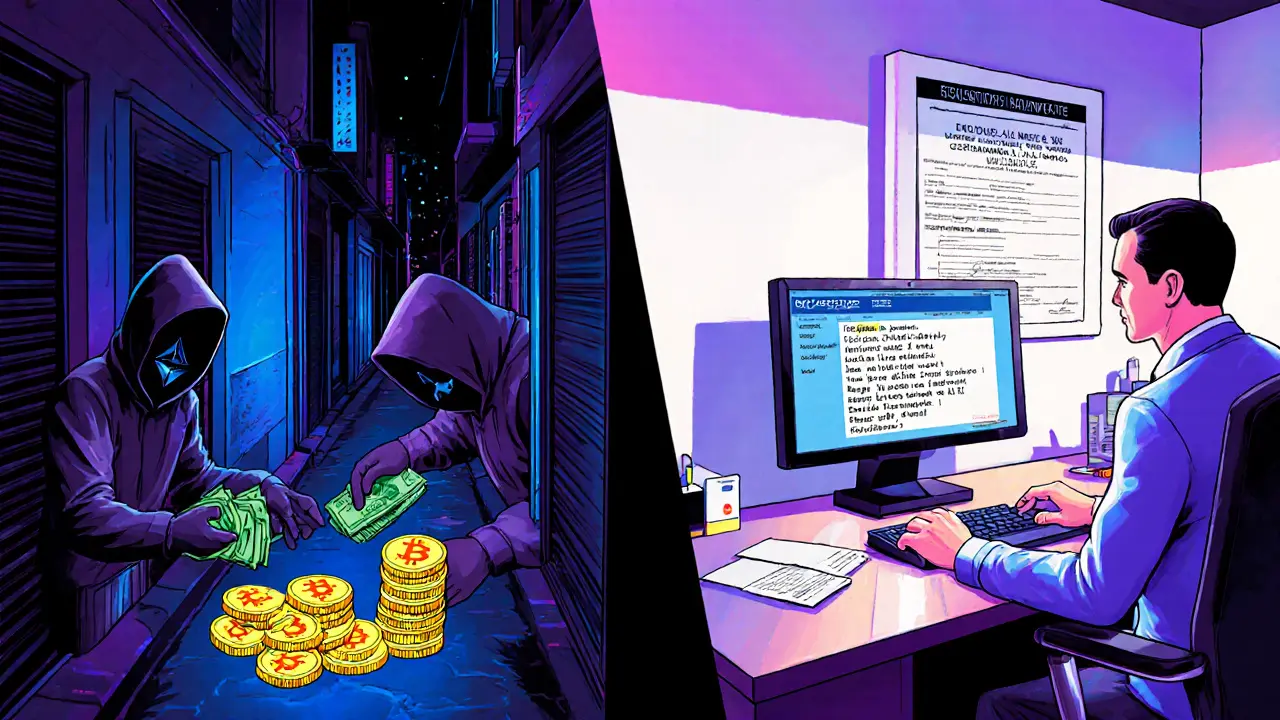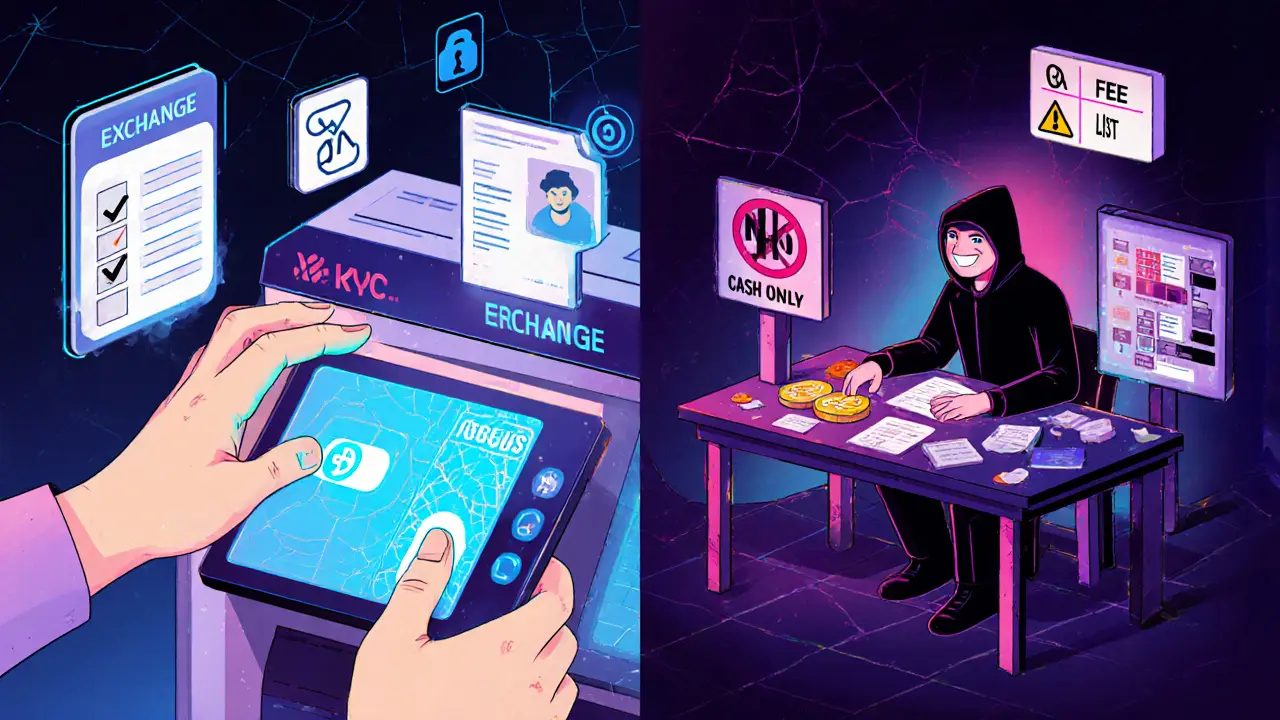Ecuador’s Underground Crypto Market: Risks, Reality & Regulation
 Jul, 20 2025
Jul, 20 2025
Crypto Safety Checker for Ecuador
Evaluate Your Crypto Transaction Safety
Check whether a potential crypto transaction in Ecuador meets regulatory standards and avoid underground market risks.
Risk Assessment Result
When you hear the phrase Underground crypto market Ecuador, the first image that pops up might be shadowy forums, cash‑only deals, and a constant cat‑and‑mouse game with authorities. The reality, however, is more nuanced. Ecuador’s crypto scene operates under a clear legal framework, yet the lack of transparent data about illicit activity leaves many questions unanswered. This article peels back the layers, explains what an underground market would look like, why it’s hard to track, and how you can stay safe whether you trade on a regulated exchange or a hidden platform.
Cryptocurrency market in Ecuador is defined as the ecosystem of buying, selling, and holding digital assets by individuals and institutions within the country’s borders. While the government permits trading, it draws a firm line by refusing to recognize any cryptocurrency as legal tender. This distinction shapes where legitimate services operate and what loopholes could give rise to underground activity.
Legal Landscape of Cryptocurrency in Ecuador
In 2018 the Ecuadorian government introduced a legal framework for electronic money, but it stopped short of regulating decentralized currencies like Bitcoin or Ethereum. The current stance can be summed up in three points:
- Trading is legal: Residents can buy, sell, and exchange crypto on licensed platforms without fear of criminal prosecution.
- Not legal tender: Cryptocurrencies cannot be used to settle everyday debts, pay taxes, or purchase goods in the same way the US dollar does.
- Compliance requirements: Exchanges must implement anti‑money‑laundering (AML) and know‑your‑customer (KYC) procedures, file periodic reports, and secure user data according to standards such as ISO 27001 and SOC 2 Type 2.
International platforms that meet these conditions - CEX.IO, Bybit, Gemini, Bit2Me, and the P2P services Binance and LocalCoinSwap - freely serve Ecuadorian users. They typically require a government‑issued ID, a selfie verification, and an address proof, all of which feed into the national AML‑KYC database.
What Defines an “Underground” Crypto Market?
In plain language, an underground market is any crypto‑related activity that sidesteps the legal safeguards described above. Key characteristics include:
- No KYC/AML: Users can trade without revealing identity, often using aliases or encrypted messaging services.
- Cash‑only or informal payment methods: Transactions happen via physical cash hand‑offs, informal money‑transfer networks, or unregulated mobile money apps.
- Lack of regulatory oversight: There is no licensing, no consumer protection, and no official audit trail.
- Higher price volatility and fees: Since risk is higher, sellers may charge a premium, and price discovery can be erratic.
These traits mirror underground markets for drugs, weapons, or counterfeit goods - they thrive on anonymity and the promise of bypassing official controls.
Why Information on Ecuador’s Underground Market Is Scarce
Several factors contribute to the data vacuum:
- Limited law‑enforcement disclosures: Ecuadorian authorities rarely publish details of investigations or arrests related to crypto, either to avoid public panic or because cases are still under investigation.
- Small user base: Compared to neighboring countries like Colombia or Brazil, Ecuador has a modest crypto‑trading population, reducing the volume of illicit activity.
- Digital concealment: Underground groups use encrypted platforms (Telegram, Signal) and privacy‑focused coins (Monero, Zcash) that leave little forensic trail.
- Academic research lag: Universities and think‑tanks have only recently begun studying crypto in Latin America, so peer‑reviewed data is still emerging.
Because of these hurdles, most publicly available reports focus on the legal side, leaving the shadow economy largely invisible.

Typical Channels That Could Host Illegal Crypto Activity
Even without concrete statistics, we can outline the most plausible pathways based on patterns seen elsewhere in the region:
- Peer‑to‑peer (P2P) “off‑platform” deals: While Binance P2P and LocalCoinSwap operate legally, users sometimes arrange direct cash‑handovers outside the platform to evade fees or KYC.
- Underground forums: Dark‑web marketplaces such as those hosted on Tor can list “crypto for cash” services, often advertised in Spanish‑speaking circles.
- Remittance networks: Informal money‑transfer agents (known locally as “coyotes”) may accept cash and credit it to a crypto wallet, effectively laundering funds.
- Street vendors and “crypto kiosks”: Small shops in metropolitan areas sometimes allow customers to buy Bitcoin with cash, but without any registration.
Each channel bypasses at least one regulatory checkpoint, making it attractive to users who value privacy or want to avoid taxation.
Red Flags and How Users Can Protect Themselves
If you suspect you are dealing with an underground operator, watch for these warning signs:
- No official documentation: The seller cannot provide a website, terms of service, or any legal entity registration.
- Pressure tactics: Claims like “price only valid for the next 5 minutes” or “no refunds” are classic scams.
- Requests for cash drops: Insisting on meeting in a park or a public square to exchange money for crypto is a red flag.
- Unusual payment methods: Requests for prepaid phone cards, gift cards, or obscure e‑wallets often indicate illicit activity.
- Lack of two‑factor authentication (2FA): Legitimate exchanges always enable 2FA; a platform that doesn’t may be unsafe.
To stay safe, follow this simple checklist:
- Choose a platform listed in the Central Bank’s approved crypto‑service provider directory.
- Verify the platform’s KYC policy: can you upload a passport or national ID?
- Enable 2FA, preferably using an authenticator app rather than SMS.
- Start with a small test transaction before moving larger amounts.
- Keep records of every trade - invoices, screenshots, and wallet addresses - in case tax authorities request proof.

Comparison: Legal Exchanges vs Potential Underground Services
| Attribute | Legal Exchanges (e.g., CEX.IO, Binance P2P) | Underground Services (e.g., cash‑hand‑offs, dark‑web vendors) |
|---|---|---|
| Regulatory Status | Licensed, AML/KYC compliant | Unlicensed, no regulatory oversight |
| Identity Verification | Required (ID, selfie, address) | None or pseudonymous |
| Security Measures | 2FA, cold storage, insurance | Variable; often none |
| Fees | Transparent fee schedule (0.1‑0.5% typical) | Often higher, hidden, or “premium” fees |
| Legal Recourse | Customer support, dispute resolution, possible refunds | None; loss is usually permanent |
| Transaction Speed | Instant for on‑chain, minutes for fiat withdrawals | Depends on cash meet‑up timing; can be delayed |
| Risk of Law Enforcement Action | Low; platforms cooperate with authorities | High; participants may face charges for money‑laundering |
Practical Checklist for Navigating Crypto Safely in Ecuador
Use this quick‑reference guide before you click “Buy” on any platform:
- Confirm the platform appears on a reputable list (e.g., Binance, CEX.IO, Gemini).
- Verify that the site uses HTTPS and displays a valid SSL certificate.
- Complete the KYC process; keep a copy of the verification email.
- Activate two‑factor authentication using an authenticator app.
- Read the fee structure; compare it with at least two other exchanges.
- Test with a small amount (e.g., $50) before committing larger capital.
- Document every transaction - wallet address, date, amount, and counterparties.
- Stay updated on regulatory news via the Superintendencia de Bancos or reputable crypto news sites.
Following this list reduces exposure to the hidden risks that underground markets often exploit.
Frequently Asked Questions
Is crypto trading illegal in Ecuador?
No. Ecuador permits buying, selling, and holding cryptocurrencies, but it does not recognize them as legal tender. Trading must occur on platforms that comply with AML and KYC rules.
What are the biggest signs of an underground crypto operation?
Absence of identity checks, cash‑only hand‑offs, pressure to move quickly, and lack of a verifiable website are the most common red flags.
Can I get arrested for using a P2P platform?
Using a regulated P2P service like Binance P2P is legal, provided you complete the required KYC. Problems arise only if you deliberately circumvent those checks or engage in money‑laundering.
How can I report suspicious crypto activity?
Report to the Superintendencia de Bancos y Seguros (SBS) via their online portal, or forward evidence to the Fiscalía General del Estado.
Are there any tax obligations for crypto gains?
Yes. Capital gains from crypto are considered taxable income in Ecuador. Keep detailed records and consult a tax professional to file correctly.
paul boland
October 23, 2025 AT 18:35DINESH YADAV
October 24, 2025 AT 01:23rachel terry
October 24, 2025 AT 09:07Melodye Drake
October 25, 2025 AT 01:54Marlie Ledesma
October 25, 2025 AT 11:34Daisy Family
October 26, 2025 AT 07:35Paul Kotze
October 26, 2025 AT 23:44Jason Roland
October 27, 2025 AT 12:45